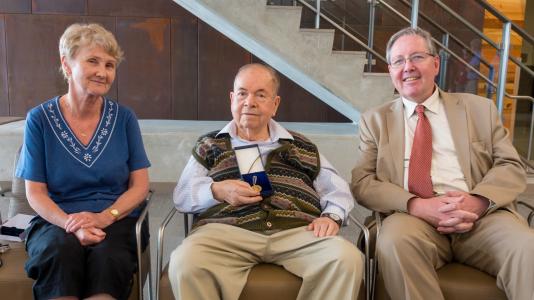
Alexei Abrikosov, a distinguished scientist at the U.S. Department of Energy’s Argonne National Laboratory and a Nobel Prize recipient, has been recognized again for his groundbreaking work. Abrikosov has received the Gold Medal of Vernadsky of the National Academy of Sciences of the Ukraine.
“Those of us in theoretical physics have our icons, and one of those icons is right here at Argonne,” said lab director Peter B. Littlewood, who gathered recently with some of Abrikosov’s colleagues to present the medal. Named for renowned mineralogist and geochemist Vladimir Ivanovich Vernadsky, founder of the Ukrainian National Academy, the Gold Medal of Vernadsky is the country’s highest academic distinction.
Abrikosov, along with Vitaly Ginzburg and Anthony James Leggett, was awarded the 2003 Nobel Prize in Physics for theories on superconductivity and superfluidity. Abrikosov discovered the “type-II superconductor” and its magnetic properties, now called the Abrikosov vortex lattice. “Alex’s achievements laid a foundation for years of research and discovery to come,” Littlewood said. “His work is also instrumental to technology that affects our personal and professional live—MRI machines, particle accelerators, and cell phones, just to name a few.”
Abrikosov has been an inspiration and an exemplar to his colleagues at Argonne and to researchers worldwide, Littlewood added. “We aspire to his intellect, to the perseverance he showed in the face of criticism during his early days as a scientist, and to the longevity of his accomplished career,” he said.
The beauty of the materials science program at Argonne is the way that it brings experimentalists and theorists together, said Abrikosov, who joined the Argonne staff in 1991, just as change was sweeping through his native Russia. “It is important, so that we do not lose context, that theorists work with experimentalists and discuss our work,” he said. “At Argonne these conversations didn’t have to be arranged as formal seminars—you could just walk down the corridors and discuss.
“When I came to Argonne, I didn’t know what it would be like,” Abrikosov added. “It ended up being one of the best choices I could make.” During his tenure at the lab Abrikosov led the Condensed Matter Theory Group for eight years. He retired in September 2014.
The impact of Abrikosov’s career cannot be overestimated, said Mike Norman, director of the Materials Science Division at Argonne. Norman noted that Abrikosov’s name appears on one of Argonne’s Named Fellow positions and an international physics prize on superconductors, awarded this year to MSD’s Alex Koshelev along with two other researchers.
“Alex has hosted a number of postdocs and visitors over the years, and along with his own work, has enhanced Argonne’s research in fundamental properties of metals and superconductors,” Norman said.
As part of the medal presentation, Littlewood read from a letter to Abrikosov from Ukrainian National Academy President Boris Paton. “The National Academy of Sciences values your outstanding contributions in the development of the theory of normal and superconducting metals and your long, active cooperation with Ukrainian scientists,” Paton wrote.
Argonne National Laboratory seeks solutions to pressing national problems in science and technology. The nation’s first national laboratory, Argonne conducts leading-edge basic and applied scientific research in virtually every scientific discipline. Argonne researchers work closely with researchers from hundreds of companies, universities, and federal, state and municipal agencies to help them solve their specific problems, advance America’s scientific leadership and prepare the nation for a better future. With employees from more than 60 nations, Argonne is managed by UChicago Argonne, LLC for the U.S. Department of Energy’s Office of Science.
DOE’s Office of Science is the single largest supporter of basic research in the physical sciences in the United States, and is working to address some of the most pressing challenges of our time. For more information, please visit science.energy.gov.